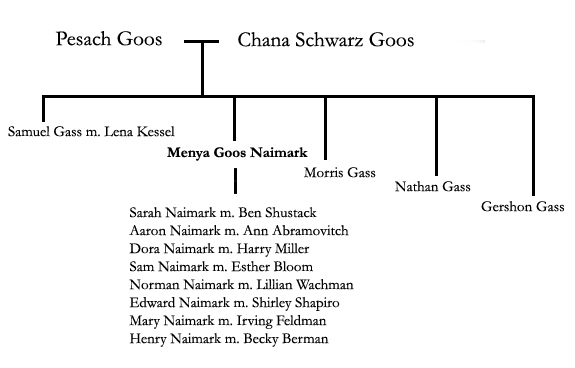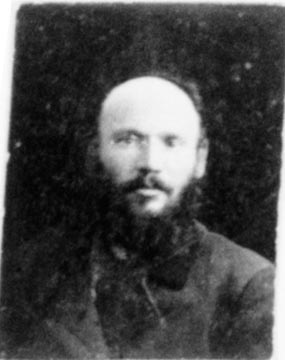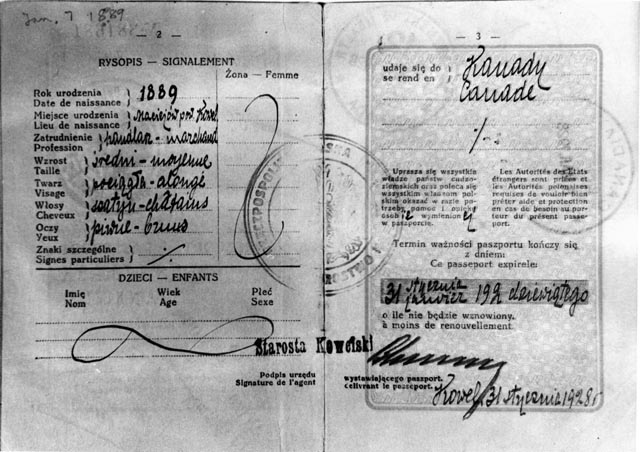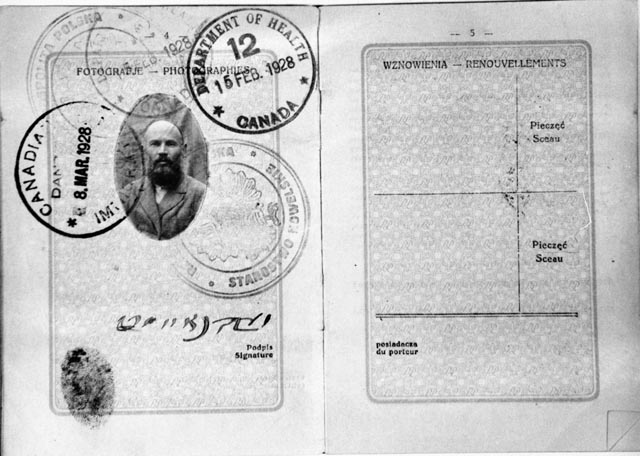
Menya Goos Naimark and
Jacob Naimark
Refuge in Canada

|
|
|
Minnie Goos Naimark (1883-1965) and Jacob Naimark (1880-1957) |
Menya Goos, the second oldest of Pesach and Chana Goos's children, had a more difficult life than her brothers. Menya was born in Turiysk, Russia, on January 6, 1883, and when she was a young woman, she entered into an arranged marriage with Jacob (Yankel) Naimark. They lived in Menya’s childhood home, the house that had belonged to Pesach Goos. Although Menya and Jacob had 10 children, the marriage was not a happy one.
All of the Naimark children were born in Turiysk. The oldest child, a son, died in Turiysk at age 16, and another child died at birth. Their names have been forgotten. Menya and Jacob brought their eight surviving children with them to Montreal, Canada, in March 1927. They included:
Sarah Naimark Shustack (1907-1983)
Dora (Dvorah) Naimark Miller (1909-1981)
Aaron Naimark (1910-1987)
Sam (Shloime) Naimark (Born: 1913)
Norman (Nute) Naimark (1914-1987)
Mary (Chana Miriam) Naimark Feldman (Born: 1916)
Edward (Isick) Naimark (Born: 1918)
Henry (Huna) Naimark (Born: 1920)
|
|
|
Canadian document enabling the Naimark family to immigrate to Canada |
After the first of the children were born, Jacob immigrated to the United States. He probably went between the births of Aaron and Sam. Jacob visited Chelsea, Massachusetts, where his brother-in-law, Samuel Gass, had already established himself in the rag recycling business. However, Jacob decided to set down roots in New York City because friends from Turiysk—landsmen—had settled there. Jacob lived in New York for two years, but lacking a trade and an education he found it too difficult to succeed, and so he returned to his family in Russia.
|
|
 |
|
Jacob Naimark’s early passport photos and passports from the old country |
|
|
|
 |
 |
|
Click on the documents above for translations.
Menya's son Sam Naimark remembered their life in Turiysk:
"I grew up in a small village with about 150 Jewish families. It was on a river in the Ukraine, near the Polish-Russian border. The town was one-third Jewish, one third-Polish and one-third Ukrainian. The Ukrainians hated the Poles, the Poles hated the Ukrainians, and both of them hated the Jews. I have a scar on my head from an unprovoked attack in Turiysk. A boy—either Polish or Ukrainian—threw a stone and struck me in the head. The gash required stitches but there was no doctor available. Polacks in gangs would sneak behind Jewish men and cut off their beards with knives. This happened to my father once and after that he kept off the beard.
"My father worked hard at different jobs. For a while he was in the wool business. He walked miles and miles to Warsaw to collect wool. He would be gone three or four days. Then he returned home and dyed the wool. He sold it on Tuesdays—market day. People came to Turiysk from all the small villages around it to sell and buy goods. My father was able to sell the wool but he could not make a living. My mother's brothers sent her money from America. Jacob was not lazy, and he was resentful that he had to depend on his brothers-in-law for support.
"The Ukraine is a region for growing grain. At first in Turiysk there were only windmills to grind the grain. Then one man built a water mill on the river. He knew the business, but he was uneducated and old, so he needed a smart Jew to run it. My father managed the mill for him, and we all worked at the mill. The grain in fifty-pound sacks would be brought in to be weighed. My job was to record the weight and figure out the price for grinding it. Then the sacks were carried upstairs and the grain was ground into flour.
“In Turiysk, my mother had a lot of friends. She was a very likable woman and good to the children. She worked very hard but always employed a Ukrainian woman who lived with us. As cramped as we were in our small house we had to find the woman a place to sleep. She helped my mother with the housework.
"In back of the house we had about three acres of land. Every growing season this woman, my mother, and the oldest children would help to cultivate the land to grow all kinds of vegetables—lots of vegetables, which would last us practically from one growing season to another.”